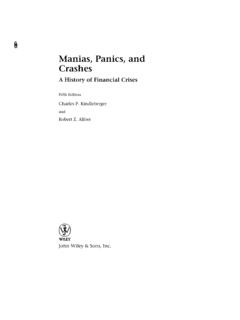Transcription of Economics: A Very Short Introduction - Grasping Reality by ...
1 Economics: A Very Short IntroductionVery Short Introductions are for anyone wanting a stimulatingand accessible way in to a new subject. They are written by experts, and havebeen published in more than 25 languages series began in 1995, and now represents a wide variety of topicsin history, philosophy, religion , science, and the humanities. Over the nextfew years it will grow to a library of around 200 volumes a Very ShortIntroduction to everything from ancient Egypt and Indian philosophy toconceptual art and Short Introductions available now:ANARCHISMC olin WardANCIENT EGYPTIan ShawANCIENT PHILOSOPHYJ ulia AnnasANCIENT WARFAREH arry SidebottomANGLICANISMMark ChapmanTHE ANGLO-SAXON AGEJohn BlairANIMAL RIGHTSD avid DeGraziaARCHAEOLOGYPaul BahnARCHITECTUREA ndrew BallantyneARISTOTLEJ onathan BarnesART HISTORYDana ArnoldART THEORY Cynthia FreelandTHE HISTORY OFASTRONOMY Michael HoskinAtheismJulian Baggini AugustineHenry ChadwickBARTHESJ onathan CullerTHE BIBLEJohn RichesTHE BRAINM ichael O SheaBRITISH POLITICSA nthony WrightBuddhaMichael CarrithersBUDDHISMD amien KeownBUDDHIST ETHICSD amien KeownCAPITALISMJ ames FulcherTHE CELTSB arry Cunliffe CHOICE THEORYM ichael AllinghamCHRISTIAN ARTBeth WilliamsonCHRISTIANITYL inda WoodheadCLASSICS Mary Beard andJohn HendersonCLAUSEWITZM ichael HowardTHE COLD WARR obert McMahonCONSCIOUSNESSS usan BlackmoreCONTEMPORARY ARTJ ulian StallabrassContinental PhilosophySimon CritchleyCOSMOLOGYP eter ColesTHE
2 CRUSADESC hristopher TyermanCRYPTOGRAPHYFred Piper and Sean MurphyDADA AND SURREALISMD avid HopkinsDarwinJonathan HowardTHE DEAD SEA SCROLLST imothy LimDemocracyBernard CrickDESCARTESTom SorellDESIGNJohn HeskettDINOSAURSD avid NormanDREAMINGJ. Allan HobsonDRUGSL eslie IversenTHE EARTHM artin RedferneconomicsPartha DasguptaPartha DasguptaECONOMICSA Very Short Introduction13 Great Clarendon Street, Oxford ox2 6dpOxford University Press is a department of the University of furthers the University s objective of excellence in research, scholarship,and education by publishing worldwide inOxford New YorkAuckland Cape Town Dar es Salaam Hong Kong KarachiKuala Lumpur Madrid Melbourne Mexico City NairobiNew Delhi Shanghai Taipei TorontoWith offices inArgentina Austria Brazil Chile Czech Republic France GreeceGuatemala Hungary Italy Japan Poland Portugal SingaporeSouth Korea Switzerland Thailand Turkey Ukraine VietnamOxford is a registered trade mark of Oxford University Pressin the UK and in certain other countriesPublished in the United Statesby Oxford University Press Inc.
3 , New York Partha Dasgupta 2007 The moral rights of the author have been assertedDatabase right Oxford University Press (maker)First published as a Very Short Introduction 2007 All rights reserved. No part of this publication may be reproduced,stored in a retrieval system, or transmitted, in any form or by any means,without the prior permission in writing of Oxford University Press,or as expressly permitted by law, or under terms agreed with the appropriatereprographics rights organizations. Enquiries concerning reproductionoutside the scope of the above should be sent to the Rights Department,Oxford University Press, at the address aboveYou must not circulate this book in any other binding or coverand you must impose this same condition on any acquirerBritish Library Cataloguing in Publication DataData availableLibrary of Congress Cataloging in Publication DataData availableTypeset by RefineCatch Ltd, Bungay, SuffolkPrinted in Great Britain byAshford Colour Press Ltd.
4 , Gosport, HampshireISBN 978 0 19 285345 513579108642 ContentsPrefacexList of illustrationsxiiiList of tablesxivPrologue11 Macroeconomic history142 Trust303 Communities644 Markets725 Science and Technology as institutions906 Households and firms1007 Sustainable economic development1178 Social well-being and democratic government139 Epilogue158 Further reading161 Index163 PrefaceWriting an Introduction to economics is both easy and hard. It seasy because in one way or another we are all economists. No one,for example, has to explain to us what prices are we face themevery day. Experts may have to explain why banks offer interest onsaving deposits or why risk aversion is a tricky concept or why theway we measure wealth misses much of the point of measuring it,but none of these is an alien idea. As economics matters to us, wealso have views on what should be done to put things right when wefeel they are wrong. And we hold our views strongly because ourethics drive our politics and our politics inform our thinking economics we don t entertain doubts.
5 So, the veryreasons we want to study economics act as stumbling blocks even aswe try to uncover the pathways by which the economic world getsshaped. But as economics is in large measure about those pathways it s as evidence-based a social science as is possible it shouldn tbe surprising that most often disagreements people have overeconomic issues are, ultimately, about their reading of facts , notabout the values they hold. Which is why writing an introductionto economics is I first drew up plans to write this book, I had it in mind tooffer readers an overview of economics as it appears in leadingeconomics journals and textbooks. But even though the analyticaland empirical core of economics has grown from strength tostrength over the decades, I haven t been at ease with the selectionof topics that textbooks offer for discussion (rural life in poorregions that is, the economic life of some billion people doesn t get mentioned at all), nor with the subjects that areemphasized in leading economics journals (Nature rarely appearsthere as an active player).
6 It also came home to me that OxfordUniversity Press had asked me to write a very Short Introduction toeconomics and there are economics textbooks that are over 1,000pages long! So it struck me that I should abandon my original planand offer an account of the reasoning we economists apply in orderto understand the social world around us and then deploy thatreasoning to some of the most urgent problems Humanity facestoday. It s only recently that I realized that I would be able to do thatonly if I shaped the discourse round the lives of my two literarygrandchildren Becky and Desta. Becky s and Desta s lives are asdifferent as they can be, but as they are both my grandchildren, Ibelieve I understand them. More importantly, economics hashelped me to understand ideas developed here were framed and explored in my book, AnInquiry into Well-Being and Destitution (Oxford: Clarendon Press,1993). While writing that book I realized that economics hadincreasingly driven my ethics and that my ethics in turn hadinformed my politics.
7 As that is an unusual causal chain, the earlierbook was more technical and a lot heavier . Theoretical andempirical advances since it was published have led me to hold theviewpoint I advanced there even more strongly now. I understandthings much better than I did then including why I don tunderstand many things. The present work is a natural extension ofmy earlier preparing this monograph I have benefited greatly fromcorrespondence and discussions with Kenneth Arrow, GretchenDaily, Carol Dasgupta, Paul Ehrlich, Petra Geraats, LawrenceGoulder, Timothy Gowers, Rashid Hassan, Sriya Iyer, PramilaKrishnan, Simon Levin, Karl-G ran M ler, Eric Maskin, PranabMukhopadhay, Kevin Mumford, Richard Nolan, Sheilagh Ogilvie,Kirsten Oleson, Alaknanda Patel, Subhrendu Pattanaik, WilliamPeterson, Hamid Sabourian, Dan Schrag, Priya Shyamsundar, JeffVincent, Martin Weale, and Gavin Wright. The present versionreflects the impact of the comments I received on an earlier draftfrom Kenneth Arrow, Carol Dasgupta, Geoffrey Harcourt, MikeShaw, Robert Solow, and Sylvana Tomaselli.
8 Sue Pilkington hashelped me in innumerable ways to prepare the book for am grateful to them John s CollegeCambridgeAugust 2006 List of illustrations1 Becky s home2 John Henley/Corbis2 Becky riding to school3 MonicaDalmasso/Stone/Getty Images3 Desta s home4 Mike HughesPhotography/Alamy4 Desta at work5 Sean Sprague/Still Pictures5 Children gatheringwood48 DominicHarcourt-Webster/Panos Pictures6 Relationship betweenaverage household sdesired fertility rate andcommunity s fertilityrate607 Teff threshing inEthiopia70 Jenny Matthews/Alamy8 Demand and supplycurves759 A shopping mall inBecky s world84 Don Smetzer/Stone/GettyImages10A market in Desta sworld85 Neil Cooper/Panos Pictures1118th-century patent fortuning harpsichords96 Science Museum/SSPL12 Trading at the FrankfurtStock Exchange115 Joachim Messerschmidt/Taxi/Getty ImagesThe publisher and the author apologize for any errors or omissionsin the above list.
9 If contacted they will be pleased to rectify these atthe earliest of tables1 Rich and poor nations192 The progress of nations1343 Comparison of voting rules153 PrologueBecky s worldBecky, who is 10 years old, lives with her parents and an olderbrother Sam in a suburban town in America s Midwest. Becky sfather works in a firm specializing in property law. Depending onthe firm s profits, his annual income varies somewhat, but is rarelybelow 145,000 US dollars ($145,000). Becky s parents met atcollege. For a few years her mother worked in publishing, but whenSam was born she decided to concentrate on raising a family. Nowthat both Becky and Sam attend school, she does voluntary work inlocal education. The family live in a two-storey house. It has fourbedrooms, two bathrooms upstairs and a toilet downstairs, a largedrawing-cum-dining room, a modern kitchen, and a family room inthe basement. There is a plot of land at the rear the backyard which the family use for leisure their property is partially mortgaged, Becky s parents ownstocks and bonds and have a saving account in the local branch of anational bank.
10 Becky s father and his firm jointly contribute to hisretirement pension. He also makes monthly payments into ascheme with the bank that will cover college education for Beckyand Sam. The family s assets and their lives are insured. Becky sparents often remark that, because federal taxes are high, they haveto be careful with money; and they are. Nevertheless, they own two1cars; the children attend camp each summer; and the family takea vacation together once camp is over. Becky s parents also remarkthat her generation will be much more prosperous than wants to save the environment and insists on biking toschool. Her ambition is to become a s worldDesta, who is about 10 years old, lives with her parents and fivesiblings in a village in subtropical, southwest Ethiopia. The familylive in a two-room, grass-roofed mud hut. Desta s father growsmaize and teff (a staple cereal unique to Ethiopia) on half a hectareof land that the government has awarded him.







